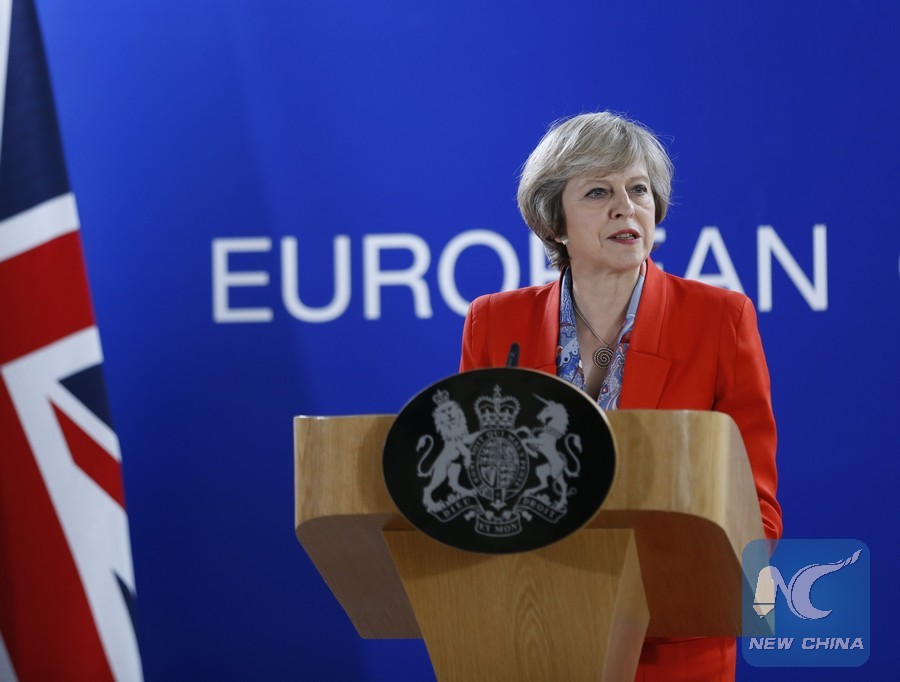
British Prime Minister Theresa May attends a press conference after the second-day's meeting of EU Summit in Brussels, Belgium, Oct. 21, 2016. (Xinhua/Ye Pingfan)
LONDON, Jan. 8 (Xinhua) -- British Prime Minister Theresa May said Sunday she will set out her plans for Britain's exit strategy from the European Union over the coming weeks.
May has faced continuous criticism from pro-Europe politicians and remain supporters over her failure to discuss her Brexit strategy, insisting she will not show her negotiating hand in advance.
In her first major television interview of the new year, May also said her government was not suffering from muddled thinking over Brexit.
She was responding to a letter to staff sent by the former British Ambassador to the EU, Sir Ivan Rogers, in which he was critical of the way the government was handling its exit plans.
Rogers' letter was revealed after he announced his resignation in Brussels.
In her interview on Sky news in London, May gave what was interpreted as her strongest hint yet that Britain will leave the EU's single market.
May said: "I'm ambitious for what we can get for the UK in terms of our relationship with the European Union because I also think that's going to be good for the European Union. We're leaving, we're coming out, we're not going to be a member of the EU. Our thinking on this isn't muddled at all."
May has reiterated her view that she will trigger Article 50, the two-year exit process before the end of March.
May told Sky news' politics show Sophy Ridge on Sunday that she does not see the decision between trade and immigration during Brexit talks "as a binary issue."
"We will, outside the European Union, be able to have control of immigration and be able to set our rules for people coming to the UK from member states of the European Union," she said.
"We also, as part of that Brexit deal, will be working to get the best possible deal in the trading relationship with the European Union. Anybody who looks at this question of free movement and trade as a sort of zero-sum game is approaching it in the wrong way."
May said she remains confident Britain will get a good deal on both issues.
Reactions to May's interview were mixed, with Sir Keir Starmer, Labor's Shadow Brexit Secretary, saying May should have been clearer over her plans for Brexit.
"I think now, 10-11 weeks from the triggering of Article 50 and the most important negotiations for a generation, we need more clarity than that, and we haven't got it," said Starmer.
Leading supporters of Britain leaving the EU welcomed May's comments with Conservative MP Steve Baker saying: "This is welcome clarification of a sensible position by the prime minister. We won't be clinging on to bits of EU membership. The best outcome for the UK is an ambitious trade deal plus control over our laws, trade policy and borders. The PM's interview is great news for the UK."
Richard Tice, co-chair of the Leave Means Leave campaign group, said: "We welcome the prime minister's commitment to taking back control of Britain's borders. therefore ending preferential treatment for EU citizens. She is right that issues of trade and immigration are not binary because when Britain leaves the single market and the customs union, though freedom of movement will cease, Britain's ability to trade with the EU and access the single market will continue."
Labour MP and leading supporter of pro-EU Open Britain group, Chuka Umunna, said: "Any trading arrangement outside the single market would erect barriers with our largest trading partner and would be disastrous for the UK economy, jobs and businesses."
Liberal Democrat leader Tim Farron, who has called for a second referendum on an eventual Brexit deal, said May's comments suggest she is taking Britain towards what he described as "a disastrous hard Brexit".
Farron commented: "Reckless plans to leave the single market would deal a huge blow to jobs, investment and the public finances, meaning less funding for services like the overstretched NHS."

